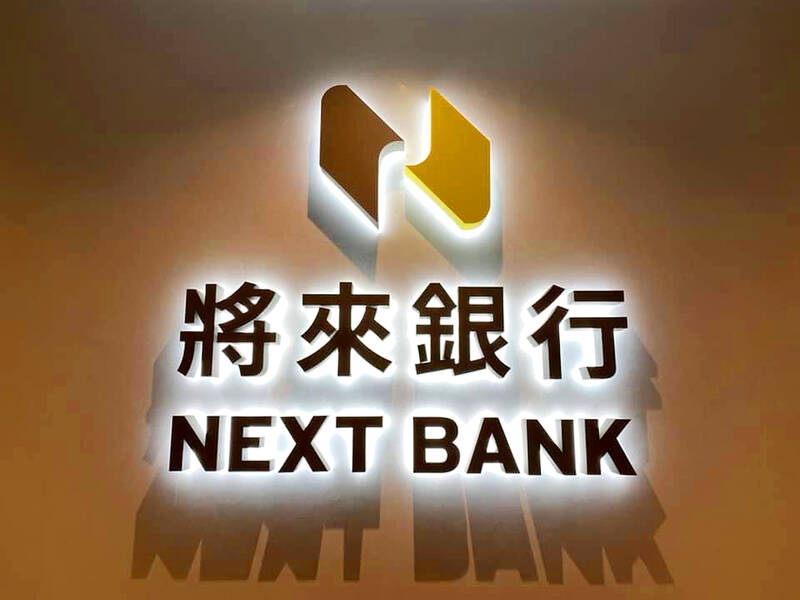Next Commercial Bank Co (將來商業銀行) yesterday said it would start selling insurance online in the fourth quarter after it on Friday received approval from the Financial Supervisory Commission to do so, ahead of the nation’s two other Web-only banks.
“Initially, we might focus on car insurance and travel insurance,” a Next Bank manager said by telephone.
The bank plans to set up an Internet platform with the latest technology for consumers to select and purchase insurance policies in the fourth quarter, it said.

Photo courtesy of Next Commercial Bank
The bank is upbeat about the new business, as selling insurance products online is becoming popular in Taiwan, it said.
The number of insurance policies and the amount of sales sold online showed significant annual increases in the first seven months of the year, it said.
Expanding into the online insurance business is a goal shared by Next Bank and Line Bank Taiwan Ltd (連線商業銀行) as a way to increase profit margins in the competitive banking market.
Line Bank has operated for more than a year, while Next Bank opened just five months ago.
Next Bank said it was moving into new businesses faster than its peers, as it also aims to launch foreign currency exchange and wealth management segments in the coming months.
As of the end of June, Line Bank led its peers with 1.23 million accounts, ahead of Next Bank’s 101,878 accounts and Rakuten International Commercial Bank Co’s (樂天國際商銀) 91,513 accounts, Financial Supervisory Commission data showed.

AI BOOST: Although Taiwan’s reliance on Chinese rare earth elements is limited, it could face indirect impacts from supply issues and price volatility, an economist said DBS Bank Ltd (星展銀行) has sharply raised its forecast for Taiwan’s economic growth this year to 5.6 percent, citing stronger-than-expected exports and investment linked to artificial intelligence (AI), as it said that the current momentum could peak soon. The acceleration of the global AI race has fueled a surge in Taiwan’s AI-related capital spending and exports of information and communications technology (ICT) products, which have been key drivers of growth this year. “We have revised our GDP forecast for Taiwan upward to 5.6 percent from 4 percent, an upgrade that mainly reflects stronger-than-expected AI-related exports and investment in the third

Mercuries Life Insurance Co (三商美邦人壽) shares surged to a seven-month high this week after local media reported that E.Sun Financial Holding Co (玉山金控) had outbid CTBC Financial Holding Co (中信金控) in the financially strained insurer’s ongoing sale process. Shares of the mid-sized life insurer climbed 5.8 percent this week to NT$6.72, extending a nearly 18 percent rally over the past month, as investors bet on the likelihood of an impending takeover. The final round of bidding closed on Thursday, marking a critical step in the 32-year-old insurer’s search for a buyer after years of struggling to meet capital adequacy requirements. Local media reports

TECHNOLOGICAL RIVALRY: The artificial intelligence chip competition among multiple players would likely intensify over the next two years, a Quanta official said Quanta Computer Inc (廣達), which makes servers and laptops on a contract basis, yesterday said its shipments of artificial intelligence (AI) servers powered by Nvidia Corp’s GB300 chips have increased steadily since last month, should surpass those of the GB200 models this quarter. The production of GB300 servers has gone much more smoothly than that of the GB200, with shipments projected to increase sharply next month, Quanta executive vice president Mike Yang (楊麒令) said on the sidelines of a technology forum in Taipei. While orders for GB200 servers gradually decrease, the production transition between the two server models has been

ASE Technology Holding Co (日月光投控), the world’s largest integrated circuit (IC) packaging and testing supplier, yesterday announced a strategic collaboration with Analog Devices Inc (ADI), coupled with the signing of a binding memorandum of understanding. Under the agreement, ASE intends to purchase 100 percent shares of Analog Devices Sdn Bhd and acquire its manufacturing facility in Penang, Malaysia, a press release showed. The ADI Penang facility is located in the prime industrial hub of Bayan Lepas, with an area of over 680,000 square feet, it said. In addition, the two sides intend to enter into a long-term supply agreement for ASE to